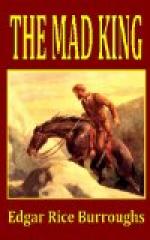The battle of Lustadt has passed into history. Outside of the little kingdom of Lutha it received but passing notice by the world at large, whose attention was riveted upon the great conflicts along the banks of the Meuse, the Marne, and the Aisne. But in Lutha! Ah, it will be told and retold, handed down from mouth to mouth and from generation to generation to the end of time.
How the cavalry that the king sent north toward Blentz met the advancing Austrian army. How, fighting, they fell back upon the infantry which lay, a thin line that stretched east and west across the north of Lustadt, in its first line of trenches. A pitifully weak line it was, numerically, in comparison with the forces of the invaders; but it stood its ground heroically, and from the heights to the north of the city the fire from the forts helped to hold the enemy in check for many hours.
And then the enemy succeeded in bringing up their heavy artillery to the ridge that lies three miles north of the forts. Shells were bursting in the trenches, the forts, and the city. To the south a stream of terror-stricken refugees was pouring out of Lustadt along the King’s Road. Rich and poor, animated by a common impulse, filled the narrow street that led to the city’s southern gate. Carts drawn by dogs, laden donkeys, French limousines, victorias, wheelbarrows—every conceivable wheeled vehicle and beast of burden—were jammed in a seemingly inextricable tangle in the mad rush for safety.
Rumor passed back and forth through the fleeing thousands. Now came word that Fort No. 2 had been silenced by the Austrian guns. Immediately followed news that the Luthanian line was falling back upon the city. Fear turned to panic. Men fought to outdistance their neighbors.
A shell burst upon a roof-top in an adjoining square.
Women fainted and were trampled. Hoarse shouts of anger mingled with screams of terror, and then into the midst of it from Margaretha Street rode a man on horseback. Behind him were a score of officers. A trumpeter raised his instrument to his lips, and above the din of the fleeing multitude rose the sharp, triple call that announces the coming of the king. The mob halted and turned.
Looking down upon them from his saddle was Leopold of Lutha. His palm was raised for silence and there was a smile upon his lips. Quite suddenly, and as by a miracle, fear left them. They made a line for him and his staff to ride through. One of the officers turned in his saddle to address a civilian friend in an automobile.
“His majesty is riding to the firing line,” he said and he raised his voice that many might hear. Quickly the word passed from mouth to mouth, and as Barney Custer, of Beatrice, passed along Margaretha Street he was followed by a mad din of cheering that drowned the booming of the distant cannon and the bursting of the shells above the city.




